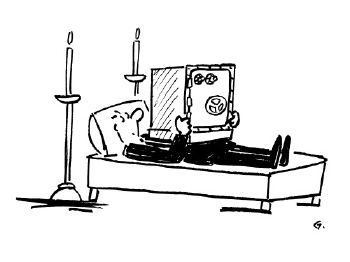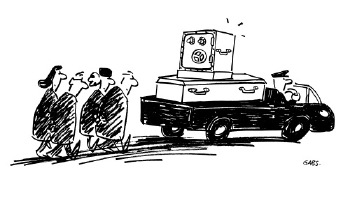Recently, I met an elder person who was expressing her sadness that many of her friends where so attached to their money, even as death was coming near. She concluded: ‟What is the point? One has never seen a safe on a coffin. »


What would we like to leave to our children? An embellished image of ourselves? Material possessions about which they will quarrel? Wouldn’t it be better to leave them a source of inspiration, a meaningful worldview that can give them confidence everyday of their life?
Wealth, pleasures, rank, and power are all searched for as a way to achieve happiness. But as we strive, we forget the goal and spend our time pursuing the means for their own sake. In so doing, we miss the point and remain deeply unsatisfied. This substitution of means for ends is one of the main traps lying in the path of the pursuit of a meaningful life. As Richard Layard, Professor at the London School of Economics, puts it: ‟Some people say you should not think about your own happiness, because you can only be happy as a by-product of something else. That is a dismal philosophy, a formula for keeping oneself occupied at all costs.”
Wealth, like any tool, can be used to build or to destroy. It can facilitate well-being and generosity or it can create greed, pride, and dissatisfaction that are obstacles to authentic happiness. Wealth can be a remarkable means to do good and, consequently, can lead to a fulfilled life. Wealth also carries risks. It can make our life miserable and can lead to harming others.
Obviously for those who lack the basic means of subsistence and for barely have enough money to survive, doubling or tripling their resources makes a great difference and brings a legitimate sense of satisfaction and relief. All studies have shown that, beyond that, further increase of wealth does not lead to a corresponding enhancement of well-being. No one would refuse a rise in salary and everyone rejoices when winning the lottery. However, apart from the temporary ‟high” that these events cause, they do not bring a lasting improvement in our state of well-being: beyond a certain point, there is simply no relation between wealth and authentic happiness.
Money can’t buy happiness, unless it’s spent on others
Yet, others studies have shown that, when it is spent on others, money can in fact buy happiness. There is an undeniable correlation between altruism and happiness. It is emotionally better to give than to receive and people who are the most altruistic also appear to be the happiest.
‟We found that people who reported spending more money on others were happier,” said Elisabeth Dunn, the main author of a study* that measured how happy people felt after either spending money on themselves, or giving money to pro-social causes, such as buying someone a meal or doing a charitable donation. This has been shown to be true with large scale philanthropy and with donations as small as five US dollars.
The work done by Martin Seligman, one of the pioneers of ‟positive psychology,” has also shown that the joy undertaking an action of disinterested kindness provides profound satisfaction. To verify his hypothesis, he asked one group of his students to go out and have fun, and another group to participate in a philanthropic activity, and then to write a report for the next class.
The results were striking: the satisfactions triggered by a pleasant activity such as going out with friends, seeing a movie, or enjoying a banana split, were largely eclipsed by those derived from performing an act of kindness. When the act was spontaneous and drew on human qualities, the entire day was improved; the subjects noticed that they were better listeners that day, friendlier, and more appreciated by others. ‟The exercise of kindness is a gratification, in contrast to a pleasure”, Seligman concludes. It is gratifying in the sense of a creating a sense of lasting satisfaction and a feeling of harmony with one’s inner nature. In this way, altruism is not a ‟sacrifice”, but brings about the twofold satisfaction of self and others.
* E. W. Dunn, L.B. Aknin, M.I. Norton, ‟Spending Money on Others Promotes Happiness”, Science, 21 mars 2008
** Many thanks to our friend Gabs, for the cartoons he kindly draw for this blog